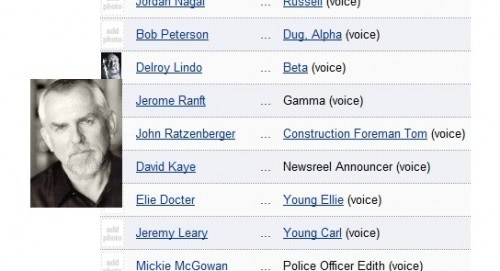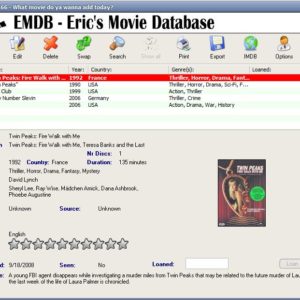Biographies “Annual Christmas Walk set for Dec. 9 - Newark Advocate” plus 4 more |
- Annual Christmas Walk set for Dec. 9 - Newark Advocate
- IMDB Movie Review Shortcut - Ghacks Technology News
- Footballers' biographies - a 'must' at Christmastime - ESPN Soccernet
- St. Chrysogonus - Catholic Online
- The Firebrand - Tablet Magazine
| Annual Christmas Walk set for Dec. 9 - Newark Advocate Posted: 24 Nov 2009 06:18 AM PST The Utica Merchants Association's Christmas Walk on Main in Utica will be Dec. 9. This wonderful, family-friendly event is a great way to enjoy the holiday season. There will be visits from Santa and Frosty, Utica Marching Band, Secret Santa Shop and more. Of course, one of the highlights is the many tables set up by local businesses. This is a great opportunity to check out what local businesses and organizations have to offer our community. Hope to see you there. CRAFT SHOWThe North Fork Music Boosters' annual Craft Show and Holiday Expo will be from 9 a.m. to 3 p.m. Dec. 5. Included will be visits with Santa, music, a silent auction, door prizes and food. Admission is free. A current list of vendors and sponsors can be viewed at www.northforkcraftshow.com. UTICA FFAThe next meeting of the Utica FFA Alumni will be at 7:30 p.m. Dec. 2 in the Ag Room. SECRET SANTA SHOPNewton Elementary PTO will host its annual Secret Santa Shop from 9 a.m. to noon Dec. 12 in the Newton Elementary School gymnasium. Children can buy gifts for family members or friends of all ages, with most gifts being priced at $5 or less. Children also can make and buy personalized gifts. While you are there, stop and get a picture with Santa. Doughnuts, coffee, juice and milk will be served throughout the morning at no cost. Beth Haines lives in Utica with her husband, Tracy, and their son, David. North Fork news can be sent to her by e-mailing bhaines001@columbus.rr.com or writing to P.O. Box 746, Utica, OH 43080. This content has passed through fivefilters.org. |
| IMDB Movie Review Shortcut - Ghacks Technology News Posted: 24 Nov 2009 02:29 AM PST If you are like me you use IMDB to look up movies that you read or heard about. The process to look up these movies was a bit tedious if you originated from a different website, say a shopping site, forum or website that listed one or multiple movie titles. To read the review on IMDB one had to copy the movie title from the website, open IMDB in the web browser, paste the movie title in the search box at IMDB and locate the correct result. IMDB Movie Review is a Firefox add-on that aids the Internet user in this task. It basically offers a shortcut to the IMDB site by selecting the movie title, right-clicking the selection and triggering the IMDB Review link that is appearing.
This shortcut actually works not only with movie titles but also other information that are stored at IMDB including artist biographies, directors or tv shows. The add-on will open a new tab and load the IMDB website in it or use an already existing tab if IMDB is already loaded. The add-on does not provide any other options beyond that functionality. It nevertheless could be interesting for users who look up movie information regularly on IMDB. IMDB Movie Review is compatible with all Firefox 2 and Firefox 3 versions (heck it is even compatible with Firefox 1.5x). It can be downloaded from the Mozilla Firefox website. Read Related Posts3 Responses to "IMDB Movie Review Shortcut"Leave a Reply Follow Ghacks Subscribe To Comment RssThis content has passed through fivefilters.org. |
| Footballers' biographies - a 'must' at Christmastime - ESPN Soccernet Posted: 15 Nov 2009 03:54 PM PST November and December are by tradition big months for book launches and, as ever, footballers will be looking for their slice of the pie. Over the next two months, we will most likely be subjected to an endless list of former stars who pour their hearts out as they look to cash in on former glories before joining a long line of football pundits, quiz shows hosts and reality TV stars on our screens.  GettyImages Glenn Hoddle's book cost him his job as England manager Over the next few months, in the run up to the World Cup, we can expect a higher-than-average stream of books about the game. But, while it would be safe to say that while they may crawl into the bestseller lists, they usually fail to get high marks within the book reviews. As with every genre of sports writing, the mainstay is the life story of the superstar player. Most book experts would rate the majority as tedious, with the only exceptions coming when the player himself is or was horribly messed-up in some way. Tony Adams' 'Addicted', for instance, or Jimmy Burns' biography of Maradona, 'The Hand of God: The Life of Diego Maradona'. With the amount of football literature pouring into the book market every year, there is an increasing demand from the publishers' side to see the authors provide amazing revelations. Indeed, the competition has become so fierce that football stars seem forced to make such deep insights into their careers and personal thoughts that they undoubtedly put their reputation at stake or, worse, risk losing their jobs. We experience this phenomenon frequently because footballers nowadays tend to publish their career stories while they are still active; 20 years ago, footballers and managers would usually serve up their revelations in retrospective. The latest example is Polish keeper Arek Onyszko, who plys his trade for FC Midtjylland in the Danish Superliga. In his autobiography, 'F*****g Polak', published in November, Onyszko makes homophobic statements and explains his dislike for women sports journalists. His club reacted instantly, sacking Onyszko and issuing the following press statement: "The book is a breach of confidence and displays a long list of attitudes incompatible with FCM and with being a role model for the fans of the club." The book sparked heated debate in Denmark - especially when one of the country's most esteemed sports professors claimed that football clubs in general couldn't expect their players to be more intelligent than the rest of the population and therefore couldn't ask them to be role models for others. Roy Keane's 2002 autobiography, 'Keane', was another famous example. Launched four years before he ended his career with Celtic, its impact was huge - rarely has any footballing autobiography stirred as much controversy his personal account of his turbulent career. His description of his ongoing feud with Manchester City's Alf-Inge Haaland was the most explosive. Keane had already been handed a three-game suspension and a £5,000 fine from the FA for a horror tackle on Haaland at Old Trafford in 2001, catching his opponent just below the knee and sending him spinning to the floor in agony. The autobiography's admission that the tackle was a premeditated assault left the FA with no choice but to charge Keane with bringing the game into disrepute, banning him for a further five matches and giving him a £150,000 fine in the ensuing investigation. How Manchester United chose to discipline Keane remains unknown. The former Germany goalkeeper Harald Schumacher was no stranger to controversy but nobody had expected that his 1987 autobiography would carry such explosive material. Schumacher became perhaps the most hated footballer on the planet when he flattened France defender Patrick Battiston in the semi-final of the 1982 World Cup. Battiston was found to be unconscious, with several shattered teeth, a broken jaw and damaged vertebrae. Schumacher, in his autobiography 'Anpfiff', maintained that his actions did not constitute a foul as well as including graphic details about alleged but unproven improprieties by German football players, including substance abuse. The book turned into one of the bestselling sports books of all time, but Schumacher didn't escape the wrath of the football community. He was immediately excluded from the German national team and his Bundesliga club Cologne. Tony Cascarino's 'Full Time', published in 2000 after his retirement, was another exception to the rule and received plenty of praise from the book critics. In the book, Cascarino claims to be a fraud because he played for the Republic of Ireland even though he didn't have Irish blood (his grandfather was Irish but his mother was adopted). He also admits to a sense of personal inadequacy: footballers are almost obliged to exude self-confidence, but Cascarino revealed he had an alter ego, sitting on the player's shoulder and offering debilitating analysis of his performance.  GettyImages Wayne Rooney found himself in trouble following the release of his book Italian bad-boy Antonio Cassano has been a controversial bad-boy all his life, but his 2008 autobiography helped the Sampdoria midfielder turn a new page in a life otherwise filled with scandalous performances. 'Dico Tutto', which translates as I'll Tell Everything, is the story of a would be criminal whose footballing genius rescued him from a life of crime and violence and rewarded him with a life of good food, great sex and, more importantly, lack of sanity on the football pitch. Yet while Cassano opens up about his struggles, he does his best to avoid the more important parts of his life like his lack of respect for his peers and instead opts to share his thoughts on life's pressing issues: sex and food. While footballers' autobiographies, boring as they occasionally may be, will usually find themselves under Christmas trees, their potential for bringing in extra pocket money for the already financially solid football stars can come at the expense of opening up old wounds. Such was the case when Jerome Rothen, a former France international, launched 'You're Not Going To Believe Me' in October 2008 and accused former Auxerre team-mate William Gallas of stealing a credit card from a team-mate and withdrawing £150 from a bank machine. Gallas later admitted to the theft but blamed Rothen for cashing in on accusations against him. Ironically, Gallas then launched an attack on team-mate Robin van Persie and other Arsenal players in the weeks leading up to the publication of his own autobiography in which he continued his outburst on another team-mate, with Samir Nasri facing his wrath on this occasion. The comments resulted in Gallas losing the Arsenal captaincy. It was the Iron Duke of Wellington who first said "publish and be damned". His comment was intended as the response to a blackmail threat, but a few footballers since then might have wished they had taken such advice when the public's verdict falls on their autobiographies. We eagerly await the next in line. This content has passed through fivefilters.org. |
| St. Chrysogonus - Catholic Online Posted: 23 Nov 2009 11:59 PM PST Feastday: November 24 St. Chrysogonus Martyr November 24 Fifth century The name of this holy martyr, who was apprehended at Rome, but beheaded at Aquileia in the persecution of Dioclesian, occurs in the canon of the mass, and is mentioned in the ancient Calendar of Carthage of the fifth century, and in all Western Martyrologies since that time. The church in Rome of which he is titular saint, is mentioned in a council held by pope Symmachus, and in the epistles of St. Gregory the Great; it gives title to a cardinal priest. The head of St. Chrysogonus is shown there in a rich case, but his body is at Venice. This content has passed through fivefilters.org. |
| The Firebrand - Tablet Magazine Posted: 24 Nov 2009 06:04 AM PST When Leon Trotsky was assassinated in Mexico City by an agent of Stalin, in 1940, the American novelist James T. Farrell took to the pages of Partisan Review to memorialize him. "The life of Leon Trotsky is one of the great tragic dramas of modern history," Farrell's obituary began, and it only gets more idolatrous from there. "Pitting his brain and will against the despotic rulers of a great empire, fully conscious of the power, the resources, the cunning and cruelty of his enemy, Trotsky had one weapon at his command—his ideas. His courage never faltered; his will never broke." To the small but influential group of his American admirers, Trotsky appeared as a kind of Soviet Garibaldi or George Washington, fighting for freedom against an evil empire. The problem, as Robert Service shows in his new biography Trotsky, is that Trotsky himself was one of the men chiefly responsible for that evil. In the October Revolution of 1917, he was second only to Lenin in leading the Bolshevik coup to success. In the years of civil war that followed, Trotsky, as commissar for the Red Army, designed the campaigns that inflicted horrific suffering on the civilian population of Russia, Poland, and Ukraine. None of the Soviet leaders outdid him in zeal for collectivization and terror, or in his commitment to spreading the Communist revolution across Europe and the world. Service, one of the leading historians of the Soviet Union and the author of biographies of Lenin and Stalin, sums up his verdict on Trotsky this way: "He was close to Stalin in intentions and practice. He was no more likely than Stalin to create a society of humanitarian socialism.… He reveled in terror." How, then, did Trotsky become a symbol, to some of the most intelligent American leftists, of a more humane and democratic Communism? In part, as Service writes (and the Farrell essay demonstrates), it was because of "their naivety. They were blind to Trotsky's contempt for their values…. Like spectators at a zoo, they felt sorry for a wounded beast." But for the Jewish intellectuals who clustered around Partisan Review, he was an especially irresistible figure, since Trotsky himself was the most powerful Jewish intellectual who ever lived. While this part of Trotsky's legacy is incidental to Service's book, it is a significant chapter in the political history of American Jews, and Trotsky helps explain both the allure and the danger of the mass murderer who was affectionately known to his followers as "the Old Man." He was born in 1879 as Leiba Bronstein—the name Trotsky was a nom de guerre, like Lenin (Vladimir Ulyanov) and Stalin (Iosif Dzugashvili). Bronstein's parents, unusually for Jews in the Russian Empire, were farmers; they belonged to a colony of Polish Jews who had settled in the Ukraine, as part of a czarist project for dispersing and assimilating the Jewish population. As Service shows at the beginning of his book, this meant that Bronstein "did not have a life associated mainly with fellow Jews." His parents were not devout, and Leiba was sent to a Lutheran German school in Odessa. Very quickly, like many young, secular Jews of his generation, Bronstein was drawn to the Communist revolutionary movement—partly out of Marxist idealism, partly out of disgust at the reactionary and anti-Semitic czarist government. He was only eighteen when he was arrested, with other members of his small, amateurish revolutionary cell, and exiled to Siberia. As with so many Russian radicals, however, Siberia was less a prison for Bronstein than a kind of finishing school. Bronstein married a fellow prisoner, Alexandra Sokolovskaya—also Jewish, like several other members of his cell—and had two children. He made contact with other Communists, and began to read the clandestine newspaper Iskra ("The Spark"), which he received hidden in the binding of an innocuous book. Iskra was edited from London and Geneva by a group of Communists including Vladimir Lenin, and Bronstein decided he had to join them. With surprising ease, Trotsky—as he was now known on his forged or stolen passport—escaped from Siberia and crossed Europe, presenting himself in London as a new recruit to the cause. (It is ironic that, compared to the later brutality of the KGB and the Gulag, the czarist police system looks like benign neglect.) It soon became clear that Trotsky was a brilliant writer: at their first meeting, Lenin greeted him with the words: "Ah, the Pen has arrived!" And it was by his pen that he became to known to revolutionaries inside and outside Russia, writing for Iskra and other illegal, but widely read, publications. In 1905, when the first Russian Revolution broke out, Trotsky smuggled himself back into St. Petersburg, where he discovered that he was equally magnetic as a platform orator. Still just 25, he became head of the Petersburg council, or Soviet; when the revolution was crushed, he was arrested again and escaped again. By 1917, Trotsky's peregrinations and expulsions had led him to New York, where he arrived "to a hero's welcome among emigrant socialist sympathizers from the Russian Empire," especially Jews—he wrote a series of articles for the Forverts, the socialist Yiddish daily. Indeed, one of the ironic themes of Service's Trotsky is the way the revolutionary kept finding himself in Jewish milieux, despite his adamant refusal to claim a Jewish identity. As Service explains, in his chapter "Trotsky and the Jews," he followed an orthodox Marxist line on matters of nationality and religion: "In his own eyes, he had ceased to be a Jew in any important sense because Marxism had burned out the fortuitous residues of his origins." He detested Zionism and the Jewish socialist Bund. Yet it is striking how many of Trotsky's closest comrades were non-Jewish Jews, just like himself. One might even say, though Service does not pursue the subject this far, that the aggressive rejection of Jewish particularity was the form in which Trotsky, and many Jews like him, lived their Jewishness. When the czar was overthrown, in February 1917, Trotsky immediately began planning to get back to Russia, and he arrived at Petersburg's Finland Station on May 4, a month after Lenin. Service traces the complex, ever-shifting circumstances of that revolutionary year, the advances and feints and retreats of the Bolsheviks, until they finally seized the capital, under Lenin and Trotsky's leadership, in October. Then came the years of triumph and power and cruelty; and then came the great fall, which turned Trotsky the commissar into the socialist martyr described by Farrell. Starting in 1923, as Lenin was crippled by strokes, Trotsky and Stalin waged a bureaucratic and propaganda war over who was entitled to succeed him. Trotsky entered the battle with many advantages. His highly visible role in the Civil War had made him iconic; he was still a brilliant and popular writer. Most important of all, he was Lenin's own choice. The ailing leader dictated a "testament" in which he warned that the struggle between Stalin and Trotsky had the potential to split the Communist Party, and he came down firmly on Trotsky's side: "Stalin is too crude and this inadequacy…becomes intolerable in the position of General Secretary." The real question, as Service convincingly frames it, is why Trotsky, given all these advantages, allowed Stalin to outmaneuver him so decisively—to the point that, by 1928, Trotsky had been stripped of office, expelled from the Party, and finally exiled from the USSR. Service concludes that Trotsky, perhaps unconsciously, did not really want to replace Lenin as sole leader of the country; that is why he "lacked the decisiveness for a concerted advance on power." While Stalin expertly manipulated the Communist Party apparatus, packing the Politburo with his supporters, Trotsky remained aloof, arrogant, inflexible. When it came to making speeches to big crowds or writing scorching pamphlets, no one could beat Trotsky. When it came to making friends and allies, he could not be bothered. And there was one other factor in Trotsky's failure of will. In 1917, just after the revolution, Lenin had wanted to appoint him as Commissar for Internal Affairs, which would have made him head of the secret police. Trotsky refused, on the grounds that "it would be inappropriate for a Jew to take charge of the police in a society pervaded by anti-Semitism. If Jews were seen to be repressing Russians, a pogrom atmosphere might be provoked." For the same reason, he initially resisted taking charge of the Red Army, and rejected the invitation to become Lenin's second-in-command in 1922. "The party's leadership was widely identified as a Jewish gang," Service writes, and "Trotsky continued to believe that his own prominence in government, party and army did practical damage to the revolutionary cause." If Trotsky allowed Stalin to get the better of him at the crucial moment, it may have been because he still feared the consequences of a Jew heading the Soviet government. Of course, such scruples made no difference to the enemies of the Jews. By the time Hitler took to power, thanks in part to the Germans' fear and hatred of "Judeo-Bolshevism," Trotsky had long since been made a non-person in Stalin's USSR. The rabbi who made the famous quip was right: "It's the Trotskys who make the revolutions, and the Bronsteins who pay the price." This content has passed through fivefilters.org. |
| You are subscribed to email updates from Biographies - Bing News To stop receiving these emails, you may unsubscribe now. | Email delivery powered by Google |
| Google Inc., 20 West Kinzie, Chicago IL USA 60610 | |



 IMDB Movie Review Links
IMDB Movie Review Links IMDb Finally Adds Movies
IMDb Finally Adds Movies 12 IMDB Userscripts
12 IMDB Userscripts Eric's Movie Database
Eric's Movie Database Manage your movie collection with Coollector
Manage your movie collection with Coollector Lego Movie Parodies
Lego Movie Parodies Download HD Movie Trailers
Download HD Movie Trailers Find Book, Music, and Movie Recommendations According to Your Tastes
Find Book, Music, and Movie Recommendations According to Your Tastes
It's much easier than installing an additional firefox add-on
- go to any IMDB page
- right click inside the search box
- Select "add keyword for this search" (I used "i", without the quotes)
Now all you have to do is hit "CTRL-T" to open up a new tab. The cursor will focus into the URL bar and you simply type "i actor/title/series", again without the quotes.
examples:
i costner
i district9
IMDB will immediately load up either a search results page if it couldn't isolate one response to the query, or in the event of the 2nd example, it will directly load up the movie's home page.
@nero
Thanks for that; though I'm a regular visitor at IMDB for quite some yrs, I hear this for the 1st time. Definetely trying it out, as I don't like having a lot of add-ons in Firefox.
The add-on is been up only for a few days as an experimental one and has zero user comments; will have to wait & see how it goes.
That's another idea firefox steal from Opera, years ago, you can add your own search to Opera, like IMDB, or your favorite blog, or wathever you want, then you just right clic the movie title, actor or other info and select search with imdb, here you go, i use this years ago, is not new. or exclusive to firefox addons, Opera is the most mature, proffesional and innovative browser out there, sorry firefox fanboys.